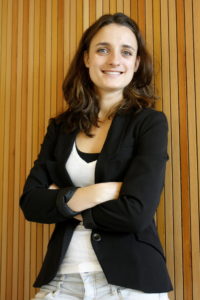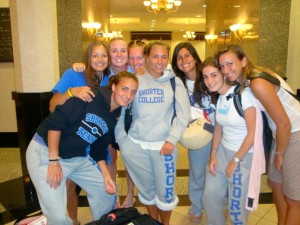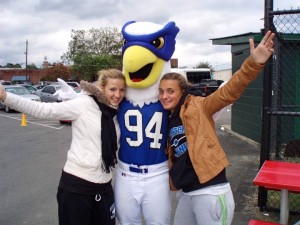1. What US school did you go to and what did you study?
I went to Shorter College (now Shorter University) in Rome, Georgia.
2. Did you play a sport when you were in the US? And if so, which one(s)?
Yes, I played for the women’s tennis team at Shorter.
3. Why did you want to study in the US?
After 6 years of the same thing in high school I wanted something new: a different environment, new people, adventure! I also loved sport, and I had no idea what I wanted to study. Then after doing a bit of research I found out that in America I could play tennis and study at the same time, my living and study expenses would largely be compensated and I didn’t have to immediately make a decision about what to study (in the Liberal Arts & Sciences system you can choose some of your own subjects alongside the compulsory ones, even from different faculties! And for the first two years your major can be ‘Undecided’), so it seemed like the ideal option. And indeed that turned out to be the case. It was been one of the best decisions of my life and I ended up staying for 2 years instead of 1.
4. What was the hardest part about settling in as an international student in the US?
What was difficult is that everything is new in the beginning, and your safe circles (your family and friends), the people whom you can normally rely on, are very far away and in a different time zone. However, I never experienced this as an issue, if it all it’s more an interesting challenge. Because you are an international student others will find you very interesting and you will quickly build up a social network. As a student-athlete, all of this is even easier. You will also have your coach and teammates to fall back on.
5. What opportunities has studying in the US offered you since you finished your studies/returned home?
Studying in America has helped me with everything and today (6 years later), I still notice the benefits with everything I do. The independence gained after such an experience, as well as the focus on communication and public speaking within the Liberal Arts and Sciences, definitely makes you stand out from other Dutch students. What’s more the American mindset of selling yourself has benefits everywhere. And of course, it’s a huge plus on your CV. People know you as ‘that girl from America’ and the fact that you have studied there automatically indicates to recruiters that you’ve learned many skills. Of course, being fluent in speaking and writing English is a great plus. And I could go on for a while, haha. Here are some concrete examples I can name: it has definitely helped me in the selection of my follow up studies/internships and then in my job-hunting – not just the experience and enhancing my CV but also in the way I approached and have proceeded through these selection processes. In chronological order: Amsterdam University College, interning at Elsevier STM Journals, MSc Drug Innovation at Utrecht University, graduate research studies at the National University of Singapore and as of September 2017 – a global traineeship at Novartis.
6. What were some of your highlights when you were in the US?
My time there was one big highlight. Each day was an adventure. You can do so much in one day since everything on campus is close by. You had college classes, could eat together and socialize with friends in the cafeteria (we spent hours there), tennis practice, cheer for other sport teams, attend concerts at the theatre or music faculties, participate in countless after-school activities, house parties, big screen movie nights, experience local life with the families of my American friends at their homes, the countless trips with my team to tournaments and matches against other schools, Disneyland, New York, National Championships, etc. etc.
7. How do you think studying in the US is different to studying at a Dutch/European university?
It’s a totally different experience. In America you truly have a ‘college-experience’: you live with everyone else on campus, it is just like in the movies. In the Netherlands/Europe you don’t do that. You might live in a student house, but it is not comparable. In the Netherlands, studying is just one part of your life, whereas in America the campus is your entire life at that moment. What’s more the school system is very different. In Europe you immediately choose your direction of study. In the States you don’t have to do that, you can choose a variety of different subjects to study to find out what you like and to put together your own combination of studies.
8. What did you think about the application process of getting into a US college or university?
The application process is incredibly long, complicated and exhausting. That’s why it’s really nice to have an organization that will guide you through the system and the 4,000 different colleges and universities. Which school is right for you? And which schools are strong in the areas of study you are interested in? Where can you get scholarships, and how? And what should you do in advance? Recommendation letters, cover letters, bank statements, visa, countless forms to fill in…. it is incredibly valuable to receive expert guidance through all of this.
9. What are you currently doing?
I have just got back from Singapore where I completed my graduate research studies and have now received my MSc. Drug Innovation (Pharmaceutical Sciences) from the University of Utrecht. Starting in September I will be doing an 19 month traineeship with Novartis, a large pharmaceutical company. It is an internal training program during which I will spend periods of 6 months in 3 different countries, working within the various different departments of the company.
10. What are some of your goals for the future?
Since I will be starting a whole new chapter in September, I have not set any long-term goals for beyond that. The purpose of the next 2 years is to discover and create what it is that I want to focus on. My general goal for the future is a rule I’ve followed since my time in America, and that is: do what I enjoy, challenge myself, and listen to my feelings in the choices I make.




